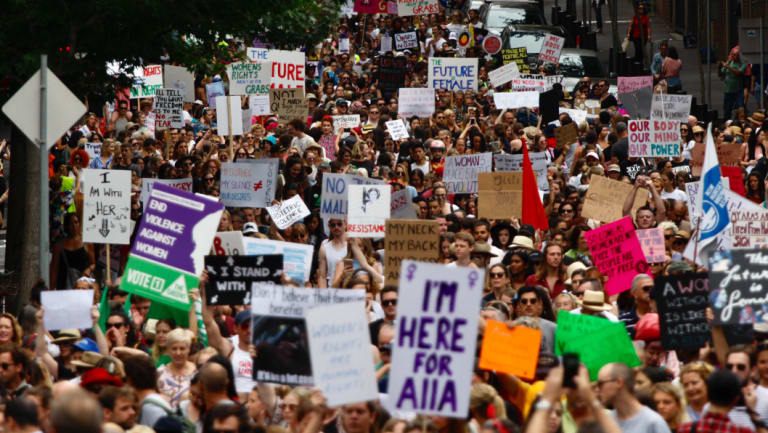FRESH AIR
Australian women’s march rallies set an example for the US
January 30, 2019 | Sharyn Mittelman

Across Australia, thousands of women and men marched in capital cities on January 20 calling for women’s equality and an end to gendered violence. Many in the crowd carried signs in memory of 21-year-old Israeli-Arab exchange student Aiia Maasarwe who was brutally raped and killed on January 16 in Melbourne’s north in an apparent random attack. Police have charged Codey Herrmann with her rape and murder. Writer Bri Lee told around 3,000 people at the Sydney Women’s March “We march today and think of Aiia”.
The Australian Women’s March rallies were focused on ending a culture of violence, reflected in shocking statistics – including that on average, one woman a week is murdered by her current or former partner, and children are also often hurt and killed in domestic violence. According to a 2016 study by Australia’s National Research Organisation for Women’s Safety (ANROWS) interpersonal violence was the single biggest contributor to preventable death and illness in women aged 18 to 44.
The focus of the Australian Women’s March rallies is something which could inspire the US Women’s March, Inc. which has been embroiled by controversy and infighting. The Women’s March, Inc. began in 2016 as a protest against the Trump Administration and generated millions of protesters in 2016 and 2017. This year, however, crowds were smaller, reduced to mere thousands.
Over several months Women’s March, Inc. has faced accusations that its leaders failed to adequately address allegations of antisemitism. Sponsors pulled out including the Democratic National Committee and the National Organization for Women.
Critics include Vanessa Wruble, an early organiser at Women’s March, Inc., who claims that she was pushed out of the organisation and believes her Jewish identity was a factor. Wruble alleged its co-chairs Tamika Mallory and Carmen Perez said in a private setting that Jews were responsible for the oppression of people of colour. Both Perez and Mallory denied the charge but acknowledged that the role of Jewish women was discussed in that first meeting. “Since that conversation, we’ve all learned a lot about how while white Jews, as white people, uphold white supremacy, ALL Jews are targeted by it,” Mallory said in a statement to The New York Times. Wruble went on to help found an organisation called March On, which supports local women activists.
However, Mallory also faced controversy for her close ties to Louis Farrakhan, the leader of the Nation of Islam, who has long made antisemitic comments including referring to Jews as “satanic” and as “termites”. Moreover, according to Wruble, the Nation of Islam provided security for Women’s March, Inc. In 2017, the Southern Poverty Law Center designated Farrakhan’s organisation as a hate group.
In response to the criticism, the Women’s March, Inc. released a statement, saying, “We want to say emphatically that we do not support or endorse statements made by Minister Louis Farrakhan about women, Jewish and LGBTQ communities.” However, Mallory has refused to condemn Farrakhan for his antisemitic comments, including recently on the TV show “The View”. Following her appearance on the program, prominent American Jewish comedian Sarah Silverman tweeted, “I cannot imagine having such mild feelings over such a furious hatred of an entire people.” She added, “[Farrakhan] calls us termites. I’m heartbroken but I’m gonna stay hopeful because I don’t wanna give up on Tamika.”
At the Women’s March rally on Jan. 19 in Washington DC, some of its leaders tried to reach out to the Jewish community during their speeches. However, co-chair American Palestinian activist Linda Sarsour, who has embraced boycotts against Israel, used her time to suggest such accusations were a distraction from the real crisis which she identified as Donald Trump’s presidency. Sarsour said: “The media can talk about whatever controversy they want, but the real controversy was in the White House,” adding, “What’s controversial is a president and administration that cages children. That throws tear gas at human beings at the border. A president who wants to take back rights for LGBTQ people. What’s controversial is our complicit support for a Saudi-led war in Yemen. Controversy is collusion with Russia. So if you want to talk about controversy, let’s start talking about the real controversy.”
This also appears to be part of the reason the movement has fractured. Rather than focusing specifically on issues to build unity including equality, freedom from discrimination and ending violence, instead the movement has embraced “intersectional feminism” defined as “the complex, cumulative manner in which the effects of different forms of discrimination combine, overlap, or intersect”. As a result it has released a policy agenda campaigning against everything from ending US support for the Saudi war in Yemen, to climate change, to fighting laws that prohibit participation in Israel boycotts. The campaign appears to have become so broad that it has lost its focus.
Even the Sydney organisers of the Women’s March attempted to distance themselves from the Women’s March, Inc. prior to the rally, releasing the following statement: “Women’s March Sydney and Women’s March Inc (Washington) are separate organisations”, noting the branches do not share “leadership, funding, or structure” and denouncing “any statements that have caused pain to the Jewish and LGBTQIA+ communities”.
Perhaps the co-chairs of Women’s March, Inc. could learn a lesson from the Women’s March rallies in Australia, with their focus on inclusiveness and ending a culture of violence that has killed so many women. They might then regain some perspective and recommit to fighting all forms of discrimination including antisemitism.
Tags: Antisemitism, Australia, United States, Women
RELATED ARTICLES

US Middle East strategy amid regional instability: Dana Stroul at the Sydney Institute

Antisemitism in Australia after the Bondi Massacre: Arsen Ostrovsky at the Sydney Institute





















